|
|
|
Sort Order |
|
|
|
Items / Page
|
|
|
|
|
|
|
| Srl | Item |
| 1 |
ID:
085986


|
|
|
|
|
| Publication |
2008.
|
| Summary/Abstract |
This article provides a study of the African National Congress (ANC) local organization at party branch level. It focuses on the branches' community activities, on their participation in party structures, and on the ANC political culture. It takes an organizational perspective on the study of political parties and refers to the mass party model. The ANC has a strong tradition of mass organization, and the ANC formal organization conforms to the mass party ideal-type: branches are meant to be active agents on the ground, while the party leadership is supposed to implement the membership's decisions. The ANC has developed a certain type of mass political culture, of popular politics. The article also shows how bottom-up decision-making processes concretely provide a certain level of influence to the members over the selection of leadership and the party's policies (even if through intermediary brokers). This article is a contribution to the renewed academic debates on African political parties and takes the stand that organizational and empirical approaches should be a priority.
|
|
|
|
|
|
|
|
|
|
|
|
|
|
|
|
| 2 |
ID:
137570
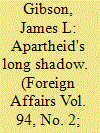

|
|
|
|
|
| Summary/Abstract |
Last April, South Africa celebrated the 20th anniversary of its first democratic elections, which brought to power the African National Congress (ANC) and its leader, Nelson Mandela, who had led the antiapartheid movement for decades. Many had long believed that civil war was the only way that the apartheid state would fall, and South Africa’s mostly peaceful transition from a racist authoritarian state to a multiracial democracy stands as one of the most surprising political developments of the twentieth century. The shift has not been without its problems, but few would contest South Africa’s credentials as a democracy—perhaps the most democratic state in Africa.
|
|
|
|
|
|
|
|
|
|
|
|
|
|
|
|
| 3 |
ID:
098507


|
|
|
|
|
| Publication |
2009.
|
| Summary/Abstract |
The article examines the Tripartite Alliance in South Africa, drawing on in-depth interviews with members of the National Union of Mineworkers employed by Eskom, South Africa's electricity parastatal. The article challenges the widespread argument that the alliance is heading for an inevitable break-up by interrogating the resilience of workers' support for the ANC. It is argued that workers continue to identify a broad range of aspirations with the party and that the ANC thus remains the primary figurehead of political and social change in these workers' political imaginations. Exploring the attitudes of Eskom workers towards the ANC's presidential succession battle, it is shown that workers continue to hold the ANC as an organization to be sacrosanct: the failures of the ANC government were considered to result from the failure of individual leaders to meet their expectations of representation, mediation, and accountability within the post-apartheid democratic era, rather than any irredeemable ideological shortcoming of the ANC itself.
|
|
|
|
|
|
|
|
|
|
|
|
|
|
|
|
| 4 |
ID:
120569


|
|
|
|
|
| Publication |
2013.
|
| Summary/Abstract |
IT IS IMPORTANT, in appraising the role of South Africa as today's player on the international political scene and an active participant in global associations of countries, to form a realistic idea of the political image the country projects internationally and the political situation inside the country. The hardest part is to make sense of the political situation inside South Africa, taking into account the evolving phenomenon of ethnic democracy.
|
|
|
|
|
|
|
|
|
|
|
|
|
|
|
|
| 5 |
ID:
054915
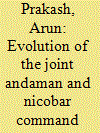

|
|
|
| 6 |
ID:
154509
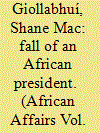

|
|
|
|
|
| Summary/Abstract |
The entry of the ANC into the arena of democratic politics provoked a dilemma for the party leadership that is familiar to political parties in a new democracy: how, if at all, should the party reform its internal organization to compete in a new electoral environment? This article draws on interviews with senior members of the ANC to develop a theory that describes how the ‘modernization’ of the ANC under President Thabo Mbeki led to his electoral defeat at the party's national conference in 2007. It contends that the process of modernization reduced systematically the role of the party's activist base in the policy-making process, creating a motive to replace the President, but left intact the role of activists in the selection of the party's leadership, which in turn provided an opportunity to replace the President at the party's national conference. The President's opponents exploited ruthlessly this opportunity by enlarging and mobilizing the party membership, using a clientelistic appeal for support, to deliver a resounding victory for their champion, Jacob Zuma. This type of clientelistic competition, which has become routine inside the ANC, undermined the democratic legitimacy of the party and its capacity to govern in the public interest.
|
|
|
|
|
|
|
|
|
|
|
|
|
|
|
|
| 7 |
ID:
085974
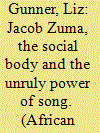

|
|
|
|
|
| Publication |
2009.
|
| Summary/Abstract |
This article tracks the life of the song 'Umshini Wami' (My Machine Gun) adopted by Jacob Zuma, the President of the African National Congress, since early 2005. It explores the wider implications of political song in the public sphere in South Africa and aims to show how 'Umshini Wami' helped Jacob Zuma to prominence and demonstrated a longing in the body politic for a political language other than that of a distancing and alienating technocracy. The article also explores the early pre-Zuma provenance of the song, its links to the pre-1994 struggle period and its entanglement in a seamless masculinity with little place for gendered identities in the new state to come. It argues too that the song can be seen as unstable and unruly, a signifier with a power of its own and not entirely beholden to its new owner
|
|
|
|
|
|
|
|
|
|
|
|
|
|
|
|
| 8 |
ID:
145959
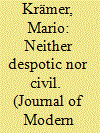

|
|
|
|
|
| Summary/Abstract |
Are South African chiefs rural and peri-urban despots or have they transformed to legitimate representatives of local interests in the post-apartheid era? This article argues that the legitimacy of chieftaincy in KwaZulu-Natal is not only based on constitutional and legal recognition, but that chieftaincy may rely on different forms of ‘basic legitimacy’. Chieftaincy is neither despotic nor civil but occupies an intermediary position between local citizens and the state. This junction position provides chiefs with specific opportunities to gain power but also requires a navigation between cooperation and conflict in the relationship with the ANC and the state.
|
|
|
|
|
|
|
|
|
|
|
|
|
|
|
|
| 9 |
ID:
134347


|
|
|
|
|
| Summary/Abstract |
Since the mid-2000s militant local political protests have been a frequent occurrence in informal settlements and townships across South Africa. Allegations of corruption and favouritism figure prominently in these demonstrations that often aim to remove local officials who are perceived not to have delivered on their electoral promises. Focusing on the relationship between patronage politics and local protests, this article analyses the 2011 unrest in Zandspruit informal settlement on the outskirts of Johannesburg. The protests were triggered by intra-African National Congress (ANC) rivalry and factionalism in the build-up to the local elections. Through an analysis of the political opportunities, framing processes, and mobilizing structures of the protests, the article depicts the ways in which patronage and collective action work together. By doing so, it reveals the agency “from below” of local elite and subaltern groups in defining the formation and mutual advancement of patron–client relations. The article thus shows how the close relationship between the ANC and the state at the local level gives rise to particular patron–client relations between low-income residents, the ANC, and the state. As a result, the state is not understood as a bureaucratic dispenser of public goods on the basis of rights but as a relational system of reciprocal dependence and obligation.
|
|
|
|
|
|
|
|
|
|
|
|
|
|
|
|
| 10 |
ID:
173170
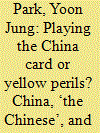

|
|
|
|
|
| Summary/Abstract |
Over the past several years there have been a number of racially-tinged incidents in South Africa involving ‘the Chinese.’ Simultaneously, the love affair between Chinese and South African government leaders has expanded to include local Chinese community leaders and local ANC officials. Based on ongoing research on Chinese communities in South Africa I examine these conflicting phenomena and explore the various ways in which the three main ethnic Chinese communities – Chinese South African, Taiwanese South African, and mainland Chinese migrant – and other South Africans respond to these often conflicting social and political messages. I argue that China’s global ascendance and South Africa’s increasing national-level dependence on China encourages some actors (both Chinese and non-Chinese) to opportunistically wield the China card while other non-Chinese South Africans respond with fear and racism, invoking Yellow Peril narratives.
|
|
|
|
|
|
|
|
|
|
|
|
|
|
|
|
| 11 |
ID:
181836


|
|
|
|
|
| Summary/Abstract |
This article examines the use of populist discourse in South African politics. We investigate speeches of leaders from the ruling African National Congress (ANC) and opposition parties, the Democratic Alliance (DA) and the Economic Freedom Fighters (EFF). We find that the EFF consistently employs populist appeals, while both the incumbent ANC and official opposition DA largely refrain. Our longitudinal analysis allows an examination of fluctuation across party leaders and electoral cycles, and illustrates that neither the ANC nor the DA have modified their political discourses in light of a rising populist challenger. However, there is some evidence that the two most dominant parties have reformed their programmatic offerings and behaviour in an attempt to compete with the EFF's popular appeal. The South African case offers important insights into the study of oppositional populism on the African continent, and a window into how major political parties may respond to emerging populist contenders.
|
|
|
|
|
|
|
|
|
|
|
|
|
|
|
|
| 12 |
ID:
138988
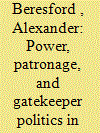

|
|
|
|
|
| Summary/Abstract |
This article examines the rise of gatekeeper politics within the ANC, drawing on an analysis of ANC discussion documents, key informant interviews with senior party officials, and interviews and observations from the ANC’s centenary policy conference. On the basis of this material, I identify the symptoms and consequences of gatekeeper politics, including the growth of patronage networks, crony capitalism, and bitter factional struggles within the party. Rather than resembling some uniquely “African” form of political aberration and breakdown, gatekeeper politics should be viewed within a broader spectrum of patronage politics evident elsewhere in the world, because it is intrinsically bound up with the development of capitalism. Political leaders who occupy positions of authority in the party or public service act as gatekeepers by regulating access to the resources and opportunities that they control. A volatile politics of inclusion and exclusion emerges and provokes bitter factional struggles within the ANC as rival elites compete for power. The rise of gatekeeper politics undermines both the organizational integrity of the ANC and its capacity to deliver on its electoral mandate. It can also depoliticize social injustice in post-apartheid South Africa by co-opting popular struggles over access to resources that might otherwise challenge the political status quo.
|
|
|
|
|
|
|
|
|
|
|
|
|
|
|
|
| 13 |
ID:
126200
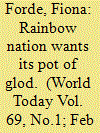

|
|
|
| 14 |
ID:
113325


|
|
|
|
|
| Publication |
2012.
|
| Summary/Abstract |
South Africa's military has, since the First World War, been an oft-used and effective tool in the conduct of South African foreign policy, but this role has not always translated into power for Defence Department principals in its formulation. South African Defence Ministers for most of the country's history have played a minor role in the making of foreign policy; despite a change in this dynamic between approximately 1975-1990, the post-apartheid era has once again seen a diminishment of Defence's power in this arena. This article examines why Defence Ministers have generally been such weak players, with an eye toward disaggregating whether this was a product of interpersonal relationships with Cabinet and - most importantly - the Head of State, or whether this influence (or lack thereof) was more a function of South Africa's international standing. While determining who has influence on this process is difficult given the primacy of the national leader in making foreign policy and a lack of insider accounts by participants in the process, this article relies upon several interviews with participants and knowledgeable observers that help illuminate the process and Defence's role in it.
|
|
|
|
|
|
|
|
|
|
|
|
|
|
|
|
| 15 |
ID:
069833


|
|
|
| 16 |
ID:
138614


|
|
|
|
|
| Summary/Abstract |
At the tail end of an overland trip from Cairo to Cape Town in 2002, travel writer and novelist Paul Theroux – then more than 60 years old and writing his thirty-eighth book – had lunch with Professor Lee Berger, an archaeologist and paleoanthropologist at the University of the Witwatersrand, in a Johannesburg mall. Recalling their conversation in his book Dark Star Safari, Theroux recounts how the professor challenged him to make a threatening face. Theroux attempted his best grimace, but his failure to bare his teeth was, for Berger, a sign that humans were ‘undoubtedly a peaceful species’. According to him, the ‘paedo-morphic face’ (or child-like, rather than aggressive, features) that humans had developed showed that they
were largely defined by ‘peacefulness and cooperation’ rather than conflict. ‘Warfare is symbolic,’ he concluded.
|
|
|
|
|
|
|
|
|
|
|
|
|
|
|
|
| 17 |
ID:
152664


|
|
|
|
|
| Summary/Abstract |
“South Africa’s organized labor movement is now, arguably, weaker and more fragmented than at any other time in the past three decades. Disagreement over how unions should relate to the ruling party, the ANC, is central to this fragmentation.” Eighth in a series on labor relations around the world.
|
|
|
|
|
|
|
|
|
|
|
|
|
|
|
|
| 18 |
ID:
097163
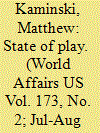

|
|
|
| 19 |
ID:
014815


|
|
|
|
|
| Publication |
Oct 1992.
|
| Description |
515-542
|
|
|
|
|
|
|
|
|
|
|
|
|
|
|
|
| 20 |
ID:
167217


|
|
|
|
|
| Summary/Abstract |
This is an examination of the political, economic and cultural ties between a member of NATO, sometimes at odds with the Western Alliance (Turkey) and a prominent country in the Non-Aligned Movement (South Africa) from the late 1980s up to the present. Turkey regards South Africa as a key state in the continent in its more recent engagement in Africa, while South Africa sees Turkey as an essential relationship in the Middle East. They share some common concerns regarding the respective regions of sub-Saharan Africa and the Middle East, respectively, like peacekeeping and development in Africa and the politics of the Israel–Palestine situation. Turkey has maintained cultural ties with South Africa’s Muslim population, but is concerned about the Gülenist presence in South Africa. While the two countries have cooperated in political endeavors, trade and investment seem most prominent in their relationship. In recent years, there have been several reciprocal visits by leaders of both countries underlining the importance of the relationship.
|
|
|
|
|
|
|
|
|
|
|
|
|
|
|
|
|
|
|
|
|